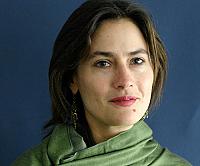The two others on the panel were Hassan Shire Sheikh- Executive Director of East and Horn of Africa Human Rights Defenders Project (EHAHRDP) and Leslie Lefkow- Researcher on the Horn of Africa at Human Rights Watch (HRW). All three highlighted the acuteness of the human rights crisis in what is described as one of the most closed countries in the world.
Chyrum started off by offering an overview of the situation in the country; as a Eritrean human rights activist herself she explained how the crackdown on independent civil society and thought in Eritrea continues to impact on defenders working from the Diaspora.
Shire focused his presentation on the situation facing journalists. He explained how human rights activists and critical journalists are perceived by Eritrean authorities as a tool used by the West and Ethiopia to undermine Eritrean sovereignty and as such, following calls in 2001 for transparency and democratic change led by reformist members of the ruling party amongst others, the authorities initiated a clampdown on all forms of critical reporting that persists to this day.
Shire raised the issue of the incommunicado detention of journalists, at least ten of which were arrested in 2001 and continue to be held to this day. He described how, given the authorities refusal to disclose important information, the exact number of journalists being held in the country’s extensive notorious prison system, their fate, location, health and legal status are still unclear. He underlined the impact on the country’s human rights situation of the complete dearth of independent and critical reporting.
“The absence of critical reporting on the human rights situation, resulting from this and ongoing clampdowns, largely obscures to the outside world the extent of the human rights violations occurring in what is rapidly becoming one of the most repressive countries in the world “ said Shire.
 Lefkow, right, used the occasion to stress the important regional component to the acute human rights crisis in Eritrea notably by explaining how the situation in Eritrea influences developments in neighbouring Somalia and Ethiopia, in particular, and vice versa. The on-going crackdown on independent civil society for example can be seen as part of a growing trend in the volatile Horn of Africa region; she therefore emphasised the need to deal with the situation with this in mind.
Lefkow, right, used the occasion to stress the important regional component to the acute human rights crisis in Eritrea notably by explaining how the situation in Eritrea influences developments in neighbouring Somalia and Ethiopia, in particular, and vice versa. The on-going crackdown on independent civil society for example can be seen as part of a growing trend in the volatile Horn of Africa region; she therefore emphasised the need to deal with the situation with this in mind.
Discussions went on to centre on the role of the EU in Eritrea, given that it is the biggest donor to the country and had, just a few days before the roundtable, on the 7th September, concluded a new funding agreement worth €122 with the Eritrean authorities.
EU representatives at the event stressed that engagement in the country and with the authorities enabled the EU to monitor the situation and encourage the authorities to take positive steps. The recently resumed political dialogue with the Eritrean authorities, which had been put on hold for two years, was given as an example of positive steps that such engagement can bring about as was the fact that the authorities had accepted to look at a list of political prisoners handed to it by the EU delegates at the last of such meetings.
Some of the constraints on EU leverage were discussed and acknowledged; nevertheless, both the panellists and many participants stressed the need and the responsibility of the EU to enhance transparency regarding the use of the funds provided and to ensure that these funds abide by both EUand international human rights legislation, notably the Cotonou agreements.
Several strong recommendations were made during the discussions. The need to establish human rights benchmarks for EU funding, progress in which would be essential for continued support by the EU, was suggested by both EHAHRDP and HRW. EHAHRDP encouraged the EU to set an improvement in the situation facing detained journalists as one of the key benchmarks for continued support. The European Council and Parliament were identified as key stakeholders in monitoring of the situation and in assessing as to whether or not the abovementioned benchmarks would be met.
The event was attended by both members of the NGO community in Brussels as well as key members of the EU institutions.
Please find attached a policy paper on Eritrea presented by EHAHRDP to the EU during its mission to Brussels.
For more information please contact Hassan Shire Sheikh, Executive Director on + 256 772 753 753 or Ms Laetitia Bader, Human Rights Officer on +256 775 141 756 or at advocacy@defenddefenders.org.
EHAHRD-Net Index GEN 024/011/2009
Regional Coordination Office
EAST AND HORN OF AFRICA HUMAN RIGHTS DEFENDERS PROJECT (EHAHRDP)
Human Rights House, Plot 1853, Lulume Rd., Nsambya
P.O. Box 70356 Kampala, Uganda
Phone: +256-312-265820/1/2/3/4
Fax: +256-312-265825
E-mail: program@defenddefenders.org, executive@defenddefenders.org, hshire@yorku.ca
Website: http://www.yorku.ca/crs/AHRDP/index.html


